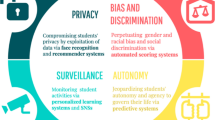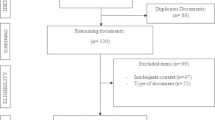Abstract
Students, the future Information and Communication Technology (ICT) professionals, are often perceived to have little understanding of the ethical issues associated with the use of ICTs. There is a growing recognition that the moral issues associated with the use of the new technologies should be brought to the attention of students. Furthermore, they should be encouraged to explore and think more deeply about the social and legal consequences of the use of ICTs.
This paper describes the development of a tool designed to raise students’ awareness of the social impact of ICTs. The tool offers guidance to students undertaking computing and computer-related courses when considering the social, legal and professional implications of the actions of participants in situations of ethical conflict. However, unlike previous work in this field, this tool is not based on an artificial intelligence paradigm. Aspects of the theoretical basis for the design of the tool and the tool’s practical development are discussed. Preliminary results from the testing of the tool are also discussed.
Similar content being viewed by others
References
Bynum, T.W. (1998) Ethics in the Information Age. 〈http://www.southernct.edu/organizations/rccs/resources/research/global_info/bynum_info_age.html〉. (Date Accessed: 10/07/2003).
Campo, J.D., Barroso, P. and Weckert, J. (2001) Teaching Computer Ethics: A Comparative Study. Proceedings of the Fifth International Conference on The Social Impacts of Information and Communication Technologies, ETHICOMP 2001, Gdansk, Poland, 18–20 June, 2001, Volume 1, 215–222.
Bynum, T.W. and Moor, J.H. (2000) How Computers are Changing Philosophy, in: Bynum, T.W. and Moor, J.H. eds. The Digital Phoenix: How Computers are Changing Philosophy. Revised Edition, Blackwell, Oxford: 1–14.
Fleischman, W.M. (2001) The Role of Imagination in a Course on Ethical Issues in Computer Science. Proceedings of the Fifth International Conference on The Social Impacts of Information and Communication Technologies, ETHICOMP 2001, Gdansk, Poland, 18–20 June, 2001, Volume 1, 171–183.
ACM (2001) Computing Curricula 2001, Computer Science Volume, Chapter 10 - Professional Practice. 〈http://www.acm.org/sigcse/cc2001/cs-professional-practice.html〉. (Date Accessed: 10/07/2003).
Thompson, J.B. (2001). Slowly Reaching Towards Software Engineering Professionalism: A Report on Recent Activities Across the World. Proceedings of the Fifth International Conference on The Social Impacts of Information and Communication Technologies, ETHICOMP 2001, Gdansk, Poland, 18–20 June, 2001, Volume 1, 14–21.
Rahanu, H. (1999) Development of a Case-based Reasoner as a Tool to Facilitate Understanding of the Ethical and Professional Issues Invoked by Failed Information Systems Projects. Ph.D. Thesis, University of Wolverhampton, Wolverhampton, UK.
Munro, K., and Munro, K. (2002) The Challenge of Teaching Ethics in a Multi-Cultural University Setting: A South African Perspective. Proceedings of ETHICOMP 2002, 13–15 November, 2002, Universidade Lusiada, Lisbon, Portugal, 643–660.
Woodcock, L. and Armstrong, B. (2001) Legal Awareness: Issues in Computing Ethics. Proceedings of the Twelfth Australasian Conference on Information Systems, 4–7 December 2001, Southern Cross University, New South Wales, Australia.
Liffick, B.W. (1995) Analysing Ethical Scenarios. Proceedings of an International Conference on the Ethical Issues of Using Information Technology, ETHICOMP95, De Montfort University, Leicester, UK, 28–30 March, 1995.
Spinello, R.A. (1997) Case Studies in Information and Computer Ethics. Prentice-Hall, Upper Saddle River, New Jersey.
Pena, R., Botia, J. and Extremera, J. (1999) Teaching Ethics Embedded in Technical Subjects. Proceedings of the Fourth International Conference on the Social and Ethical Impacts of Information and Communication Technologies, ETHICOMP’99, Libera Universita Internatzionale degli Studi Sociali, Rome, 5–8 October, 1999.
Stanoevska-Slabeva, K., Handschuh, S., Hombrecher, A. and Schmid, B.F. (1998) Efficient Information Retrieval: Tools for Knowledge Management. Proceedings of the Second International Conference on Practical Aspects of Knowledge Management (PAKM98), Basel, Switzerland, 29–30 October, 1998, 23–1 to 23–6. http://sunsite.informatik.rwth.aachen.de/Publications/CEURWS/Vol13/paper23.ps (Date Accessed: 10/07/2003)
Martin, D., Huff, C., Gotterbarn, D. and Miller, K. (1995) Curriculum Guidelines for Teaching the Consequences of Computing. Proceedings of the ACM/SIGCAS Symposium on Computers and the Quality of Life (CQL ’96), Philadelphia, PA, USA, 14 February, 1996, 73–85.
Widdison, R. (2001) Some Current Legal Issues in Legal Information Retrieval. Proceedings of the 16 th BILETA Annual Conference, 9–10 April, 2001, University of Edinburgh, Scotland. http://www.bileta.ac.uk/01papers/widdison.html (Date Accessed: 02/01/02)
Kallman, E.A. and Grillo, J.P. (1996) Ethical Decision Making and Information Technology: An Introduction with Cases. McGraw-Hill, New York.
Maner, W. (1998) ICEE: Online Ethical Scenarios with Interactive Surveys and Real-time Demographics. Proceedings of an International Conference on the Ethical Issues of Using Information Technology, Erasmus University, Rotterdam, 25–27 March, 1998, 462–470.
Zeleznikow, J. and Hunter, D. (1994) Building Intelligent Legal Information Systems. Kluwer Law and Taxation Publishers, Deventer, The Netherlands.
Moor, J.H. (2000) Assessing Artificial Intelligence and Its Critics, in: Bynum, T.W. and Moor, J.H. eds. The Digital Phoenix: How Computers are Changing Philosophy, Revised Edition, Blackwell, Oxford: 213–230.
Dreyfus, H.L. (2000) Response to My Critics, in: Bynum, T.W. and Moor, J.H. eds. The Digital Phoenix: How Computers are Changing Philosophy, Revised Edition, Blackwell, Oxford: 193–212.
Wiener, N. (1988) The Human Use of Human Beings: Cybernetics and Society. Houghton Mifflin, Boston
Kolodner, J. (1993) Case Based Reasoning. Morgan Kaufmann, San Mateo, CA.
Thagard, P. (2000) Computation and the Philosophy of Science, in: Bynum, T.W. and Moor, J.H. eds. The Digital Phoenix: How Computers are Changing Philosophy. Revised Edition, Blackwell, Oxford: 48–61.
Schweighofer, E. (1999) The Revolution in Legal Information Retrieval or: The Empire Strikes Back. Journal of Information, Law and Technology, 1999, Vol. 1. http://elj.warwick.ac.uk/jilt/99-1/schweigh.html (Date Accessed: 10/07/2003).
Smyth, B. and McKennac, E. (1999) Footprint-Based Retrieval. Proceedings of the Third International Conference on Case-Based Reasoning, ICCBR-99, Seeon Monastery, Munich, Germany. 27–30 July, 1999, 343–357. 〈http://www.cs.ucd.ie/staff/bsmyth/home/crc/iccbr99c.ps〉. (Date Accessed: 10/07/2003).
Curran, K. and Higgins, L. (2000) A Legal Information Retrieval System. Journal of Information, Law and Technology, 2000, Vol. 3. 〈http://elj.warwick.ac.uk/jilt/00-3/curran.html〉. (Date Accessed: 10/07/2003).
Hofstede, G. (1994) Cultures and Organisations: Software of the Mind. HarperCollinsBusiness, London.
Author information
Authors and Affiliations
Corresponding author
Rights and permissions
About this article
Cite this article
Sherratt, D., Rogerson, S. & Fairweather, N.B. The challenge of raising ethical awareness: A case-based aiding system for use by computing and ICT students. SCI ENG ETHICS 11, 299–315 (2005). https://doi.org/10.1007/s11948-005-0047-7
Received:
Accepted:
Issue Date:
DOI: https://doi.org/10.1007/s11948-005-0047-7




